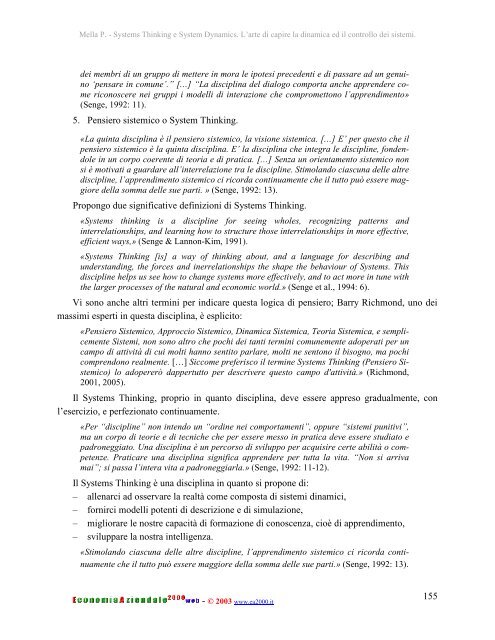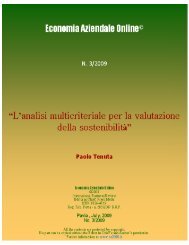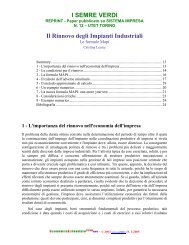Systems Thinking e System Dynamics. L'arte di capire la dinamica ...
Systems Thinking e System Dynamics. L'arte di capire la dinamica ...
Systems Thinking e System Dynamics. L'arte di capire la dinamica ...
- No tags were found...
You also want an ePaper? Increase the reach of your titles
YUMPU automatically turns print PDFs into web optimized ePapers that Google loves.
Mel<strong>la</strong> P. - <strong><strong>System</strong>s</strong> <strong>Thinking</strong> e <strong>System</strong> <strong>Dynamics</strong>. L’arte <strong>di</strong> <strong>capire</strong> <strong>la</strong> <strong>di</strong>namica ed il controllo dei sistemi.dei membri <strong>di</strong> un gruppo <strong>di</strong> mettere in mora le ipotesi precedenti e <strong>di</strong> passare ad un genuino‘pensare in comune’.” […] “La <strong>di</strong>sciplina del <strong>di</strong>alogo comporta anche apprendere comericonoscere nei gruppi i modelli <strong>di</strong> interazione che compromettono l’appren<strong>di</strong>mento»(Senge, 1992: 11).5. Pensiero sistemico o <strong>System</strong> <strong>Thinking</strong>.«La quinta <strong>di</strong>sciplina è il pensiero sistemico, <strong>la</strong> visione sistemica. […] E’ per questo che ilpensiero sistemico è <strong>la</strong> quinta <strong>di</strong>sciplina. E’ <strong>la</strong> <strong>di</strong>sciplina che integra le <strong>di</strong>scipline, fondendolein un corpo coerente <strong>di</strong> teoria e <strong>di</strong> pratica. […] Senza un orientamento sistemico nonsi è motivati a guardare all’interre<strong>la</strong>zione tra le <strong>di</strong>scipline. Stimo<strong>la</strong>ndo ciascuna delle altre<strong>di</strong>scipline, l’appren<strong>di</strong>mento sistemico ci ricorda continuamente che il tutto può essere maggioredel<strong>la</strong> somma delle sue parti. » (Senge, 1992: 13).Propongo due significative definizioni <strong>di</strong> <strong><strong>System</strong>s</strong> <strong>Thinking</strong>.«<strong><strong>System</strong>s</strong> thinking is a <strong>di</strong>scipline for seeing wholes, recognizing patterns an<strong>di</strong>nterre<strong>la</strong>tionships, and learning how to structure those interre<strong>la</strong>tionships in more effective,efficient ways,» (Senge & Lannon-Kim, 1991).«<strong><strong>System</strong>s</strong> <strong>Thinking</strong> [is] a way of thinking about, and a <strong>la</strong>nguage for describing andunderstan<strong>di</strong>ng, the forces and inerre<strong>la</strong>tionships the shape the behaviour of <strong><strong>System</strong>s</strong>. This<strong>di</strong>scipline helps us see how to change systems more effectively, and to act more in tune withthe <strong>la</strong>rger processes of the natural and economic world.» (Senge et al., 1994: 6).Vi sono anche altri termini per in<strong>di</strong>care questa logica <strong>di</strong> pensiero; Barry Richmond, uno deimassimi esperti in questa <strong>di</strong>sciplina, è esplicito:«Pensiero Sistemico, Approccio Sistemico, Dinamica Sistemica, Teoria Sistemica, e semplicementeSistemi, non sono altro che pochi dei tanti termini comunemente adoperati per uncampo <strong>di</strong> attività <strong>di</strong> cui molti hanno sentito par<strong>la</strong>re, molti ne sentono il bisogno, ma pochicomprendono realmente. […] Siccome preferisco il termine <strong><strong>System</strong>s</strong> <strong>Thinking</strong> (Pensiero Sistemico)lo adopererò dappertutto per descrivere questo campo d'attività.» (Richmond,2001, 2005).Il <strong><strong>System</strong>s</strong> <strong>Thinking</strong>, proprio in quanto <strong>di</strong>sciplina, deve essere appreso gradualmente, conl’esercizio, e perfezionato continuamente.«Per “<strong>di</strong>scipline” non intendo un “or<strong>di</strong>ne nei comportamenti”, oppure “sistemi punitivi”,ma un corpo <strong>di</strong> teorie e <strong>di</strong> tecniche che per essere messo in pratica deve essere stu<strong>di</strong>ato epadroneggiato. Una <strong>di</strong>sciplina è un percorso <strong>di</strong> sviluppo per acquisire certe abilità o competenze.Praticare una <strong>di</strong>sciplina significa apprendere per tutta <strong>la</strong> vita. “Non si arrivamai”; si passa l’intera vita a padroneggiar<strong>la</strong>.» (Senge, 1992: 11-12).Il <strong><strong>System</strong>s</strong> <strong>Thinking</strong> è una <strong>di</strong>sciplina in quanto si propone <strong>di</strong>:– allenarci ad osservare <strong>la</strong> realtà come composta <strong>di</strong> sistemi <strong>di</strong>namici,– fornirci modelli potenti <strong>di</strong> descrizione e <strong>di</strong> simu<strong>la</strong>zione,– migliorare le nostre capacità <strong>di</strong> formazione <strong>di</strong> conoscenza, cioè <strong>di</strong> appren<strong>di</strong>mento,– sviluppare <strong>la</strong> nostra intelligenza.«Stimo<strong>la</strong>ndo ciascuna delle altre <strong>di</strong>scipline, l’appren<strong>di</strong>mento sistemico ci ricorda continuamenteche il tutto può essere maggiore del<strong>la</strong> somma delle sue parti.» (Senge, 1992: 13).- © 2003 www.ea2000.it155
















